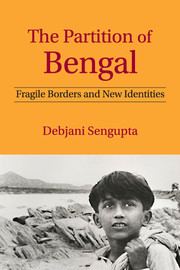Book contents
- Frontmatter
- Dedication
- Contents
- Acknowledgements
- Introduction
- 1 The Calcutta Riots in Representations and Testimonies
- 2 Noakhali and After: History, Memory and Representations
- 3 Colony Fiction: Displacement and Belonging in Post-Partition Bangla Fiction
- 4 From Dandakaranya to Marichjhapi: Refugee Rehabilitation in Bangla Partition Fictions
- 5 The Partition's Afterlife: Nation and Narration from the Northeast of India and Bangladesh
- 6 Uncanny Landscapes and Unstable Borders: Politics and Identity in Geo-Narratives of the Partition (2005–10)
- Bibliography
- Index
5 - The Partition's Afterlife: Nation and Narration from the Northeast of India and Bangladesh
Published online by Cambridge University Press: 18 December 2015
- Frontmatter
- Dedication
- Contents
- Acknowledgements
- Introduction
- 1 The Calcutta Riots in Representations and Testimonies
- 2 Noakhali and After: History, Memory and Representations
- 3 Colony Fiction: Displacement and Belonging in Post-Partition Bangla Fiction
- 4 From Dandakaranya to Marichjhapi: Refugee Rehabilitation in Bangla Partition Fictions
- 5 The Partition's Afterlife: Nation and Narration from the Northeast of India and Bangladesh
- 6 Uncanny Landscapes and Unstable Borders: Politics and Identity in Geo-Narratives of the Partition (2005–10)
- Bibliography
- Index
Summary
It is more difficult to honour the memory of the anonymous than it is to honour the memory of the famous.
Walter Benjamin, On the Concept of HistoryEven after so many years after the break-up of British India in 1947, a number of false assumptions have remained in place especially in regard to the discussions and writings on the partition that have focused mainly on the Punjab. The Punjab partition was seen as a national crisis because of its sheer scale: millions of people crossed the newly-created border, while still others faced violence, mayhem in their homes. In contrast, the partition on the eastern border did not begin with a mass exodus. In the months following the partition people trickled in and continues to do so even today. The Bengal partition, less dramatically bloody and less talked about, is only now beginning to attract critical attention but people still know very little about other provinces directly involved like Bihar, Assam or Tripura. Literary narratives of the partition have an affiliation with the nation; they offer much material for investigating the workings of the Indian state particularly in the way one remembers or forgets the events of 1947. Any study of the histories and fictions of the partition of Bengal remains incomplete unless some account of the Bangla literature from the Northeast of India and Bangladesh are taken into consideration because the division of the country had a trans-regional impact whose complex contours are slowly coming to light. For example, the Northeast of India was a creation of the partition and the region has experienced all the vagaries and problems that a forced vivisection brings in its wake: the region's economy, social and future political life have been directly affected by partition's shadows. The exigencies of the modern postcolonial state have often hidden these regional and local fallouts of the disruptions and dislocations of the partition, while a rootless and migratory population has journeyed like flotsam and jetsam in search of a livelihood and a place of sojourn.
- Type
- Chapter
- Information
- The Partition of BengalFragile Borders and New Identities, pp. 188 - 219Publisher: Cambridge University PressPrint publication year: 2015



